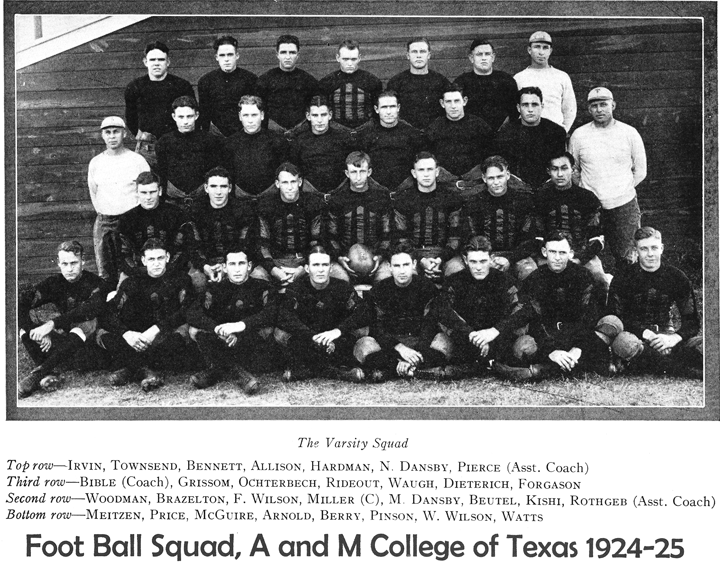
Japanese player relied on heart
Joe Michael Feist
Sit back and let me tell you a story about a groundbreaking Asian athlete who overcame obstacles to star on the Texas A&M University football team. No, not Dat Nguyen. You have to go back a little further- to the 1920s.
He was Japanese and his name was Taro Kishi.
Born in Nagaoka, Japan in 1903, Kishi came to Texas with his parents in 1907. His father, a university-educated vetern of the Russo-Japanese war, named Kichimatsu Kishi, established a Japanese colony between Beaumont and Orange in deep southeast Texas. The elder Kishi, and the tenant farmers and families he attracted, were intent on growing rice in the rich coastal plains.
In 1922, Taro enrolled at A&M to study agriculture. A natural athlete, he soon found himself on the green grass of Kyle Field playing football under legendary coach Danna X. Bible.
That he cluched a pigskin at all was a miricle. When he was 4, playing too close to a portable stove, his legs were badly burned by scalding water. A Houston doctor named Eskridge who treated him noted that he was small for his age and in poor health, and his parents related that doctors in Japan predicted the boy woul not live to maturity. Eskridge prescribed a vitamine- and protein-rich diet, and Taro soon gained strength and size, all the way to a whopping 160 pounds during his playing days.

But it must have been his drive and heart that impressed Bible.
An article in the Sept. 20, 1923, Bryan Eagle noted that Kishi, an agile half-back, would be the first Japanese to play in the Southwest Conference. "Last year he was a star with ... [the feshman team]," the story by Jinx Tucker said. "An artful dodger and exceptionally fast, he proved a splendid broken field runner on that team."
During the 1924 season, Kishi known as the "Terrible Jap," caught a touch-down pass against Baylor and returned a punt for a touchdown against Texas Christian.
In 1925, a year in which Bible and the Aggies captured the Southwest Conference championship, Kishi tore a ligament in his shoulder early in the season in a game against Trinity. But he came back to perform solidly against TCU and, in a game against Rice, played "purely on guts" after he reinjured the shoulder, according to The Battalion.
"When he leaves this year," The Battalion story continued, "the Southwest Conference will see the passing of the only Jap star that ever donned a uniform in the circuit and also of the most consistent ground gainers that the Aggies have ever known. He has made himself one of the fellows, and a truer friend and comrade we have ever known."
Kishi graduated from A&M in 1926 with a degree in agriculture and went back to the rice fields near Vidor. But his family lost the farm during the Depression, and became entirely dependent on Taro. He went to work for a Japanese shipping firm in New York, faithfully sending money home to support his parents.
After the Japanese attacked Pearl Harbor in December 1941, Kishi's father, a fervent patriot and philanthropist, was arrested and detained for a time in San Antonio (Camp Kenedy). Taro was questioned on Ellis Island, then returned to Texas, where he again took up rice farming.
By all accounts, Kishi lived a quite, temperate life. He married in 1957, and lost Elizabeth in 1984.
He loved the arts and music and gardening, not only played but made violins, sang in the Methodist church choir and bowled and played golf regularly. With friends and family he talked about his football days, about playing hurt, how the players were much smaller back then but played both ways, about blue northers that made punts fly backwards. Co-workers remember him as spry, religious, upbeat and reliable. He worked until two or three months before his death in 1993 at age 90.
If you're driving near Vidor on F.M. 1135, you may come across a historical marker with a story of Kishi Colony. And in a nearby family cemetery surrounded by rice fields, the resting place of Taro Kishi - Japanese, Aggie, football player, farmer, gentleman.
Reference
Feist, J. M., 1998, The Eagle Newspaper, Bryn, TX, (Sunday, Nov. 22), jfeist@theeagle.com
The 1925 game with Texas was described by Robert W. Akers in a November 8, 1960 column, presumably the Beaumont Enterprise.
"As to Taro Kishi, I was all too aware that he played halfback at A&M... Taro Kishi had big hand in spoiling Thanksgiving Day of 1925 for me.
I was among the thousands of Texas under graduates who made their way to College Station that clear and sunny Thursday and our recompense was the sight of young Kishi and his maroon-jerseyed cohorts whipping the Longhorns 28 to 0 - a repulsive spectacle indeed.
It was the worst beating the Aggies had ever given Texas - up to that time, anyway.
A dashing gesture of that era was to throw helmet aside and play bareheaded when the going got tough and it seems to me Kishi shock of black hair was evident in the fray. But then that may be just an imaginary embellishment of a recurring nightmare."


